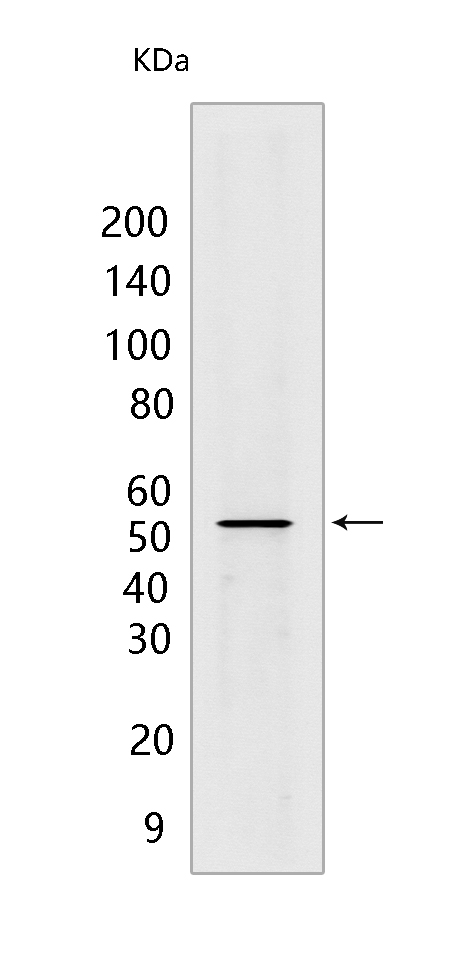Gasdermin D Rabbit mAb [5I12]Cat NO.: A15690
Western blot(SDS PAGE) analysis of extracts from Mbmdm cells treated with LPS (50 ng/ml 4 hr) followed by Nigericin(15 μM indicated times).Using Gasdermin D Rabbit mAb [5I12] at dilution of 1:1000 incubated at 4℃ over night.
Product information
Protein names :GSDMD,DFNA5L,GSDMDC1,FKSG10,GSDMD_HUMAN,Gasdermin-D [Cleaved into: Gasdermin-D, N-terminal ,Gasdermin-D, C-terminal ]
UniProtID :P57764
MASS(da) :52,801
MW(kDa) :53, 30 kDa
Form :Liquid
Purification :Protein A purification
Host :Rabbit
Isotype :IgG
sensitivity :Endogenous
Reactivity :Human,Mouse,Rat
- ApplicationDilution
- 免疫印迹(WB)1:1000-2000
- The optimal dilutions should be determined by the end user
Specificity :Antibody is produced by immunizing animals with a synthetic peptide at the sequence of Human Gasdermin D
Storage :Antibody store in 10 mM PBS, 0.5mg/ml BSA, 50% glycerol. Shipped at 4°C. Store at-20°C or -80°C. Products are valid for one natural year of receipt.Avoid repeated freeze / thaw cycles.
WB Positive detected :Mbmdm cells treated with LPS (50 ng/ml 4 hr) followed by Nigericin(15 μM indicated times)
Function : [Gasdermin-D]: Precursor of a pore-forming protein that plays a key role in host defense against pathogen infection and danger signals (PubMed:26375003, PubMed:26375259, PubMed:27281216). This form constitutes the precursor of the pore-forming protein: upon cleavage, the released N-terminal moiety (Gasdermin-D, N-terminal) binds to membranes and forms pores, triggering pyroptosis (PubMed:26375003, PubMed:26375259, PubMed:27281216).., [Gasdermin-D, N-terminal]: Promotes pyroptosis in response to microbial infection and danger signals (PubMed:26375003, PubMed:26375259, PubMed:27418190, PubMed:28392147, PubMed:32820063). Produced by the cleavage of gasdermin-D by inflammatory caspases CASP1, CASP4 or CASP5 in response to canonical, as well as non-canonical (such as cytosolic LPS) inflammasome activators (PubMed:26375003, PubMed:26375259, PubMed:27418190). After cleavage, moves to the plasma membrane where it strongly binds to inner leaflet lipids, including monophosphorylated phosphatidylinositols, such as phosphatidylinositol 4-phosphate, bisphosphorylated phosphatidylinositols, such as phosphatidylinositol (4,5)-bisphosphate, as well as phosphatidylinositol (3,4,5)-bisphosphate, and more weakly to phosphatidic acid and phosphatidylserine (PubMed:27281216, PubMed:29898893). Homooligomerizes within the membrane and forms pores of 10-15 nanometers (nm) of inner diameter, allowing the release of mature interleukin-1 (IL1B and IL18) and triggering pyroptosis (PubMed:27418190, PubMed:27281216, PubMed:29898893, PubMed:33883744). Exhibits bactericidal activity (PubMed:27281216). Gasdermin-D, N-terminal released from pyroptotic cells into the extracellular milieu rapidly binds to and kills both Gram-negative and Gram-positive bacteria, without harming neighboring mammalian cells, as it does not disrupt the plasma membrane from the outside due to lipid-binding specificity (PubMed:27281216). Under cell culture conditions, also active against intracellular bacteria, such as Listeria monocytogenes (By similarity). Also active in response to MAP3K7/TAK1 inactivation by Yersinia toxin YopJ, which triggers cleavage by CASP8 and subsequent activation (By similarity). Strongly binds to bacterial and mitochondrial lipids, including cardiolipin (PubMed:27281216). Does not bind to unphosphorylated phosphatidylinositol, phosphatidylethanolamine nor phosphatidylcholine (PubMed:27281216)..
Tissue specificity :Expressed in the suprabasal cells of esophagus, as well as in the isthmus/neck, pit, and gland of the stomach, suggesting preferential expression in differentiating cells..
Subcellular locationi :[Gasdermin-D]: Cytoplasm, cytosol. Inflammasome.
IMPORTANT: For western blots, incubate membrane with diluted primary antibody in 1% w/v BSA, 1X TBST at 4°C overnight.


